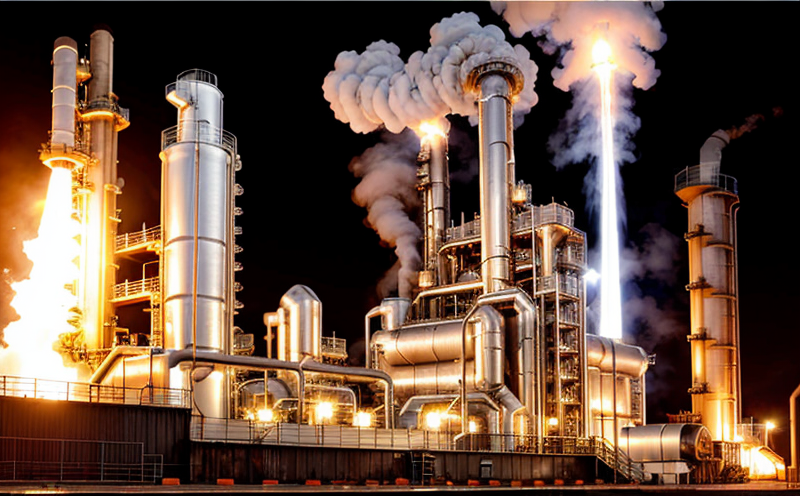ISO 10720 Determination of Hydrogen in Nickel Alloys
The ISO 10720 standard provides a precise method to determine hydrogen content in nickel alloys. This is crucial for industries reliant on materials with minimal hydrogen contamination, such as aerospace and nuclear sectors. The process involves the reaction between the sample and water vapor at elevated temperatures to release hydrogen gas. The released hydrogen is then measured using gas chromatography or other suitable analytical techniques.
The procedure outlined in ISO 10720 is designed to ensure accurate and reproducible results, making it a cornerstone for quality control processes. By adhering strictly to the method, laboratories can provide reliable data that supports critical decisions regarding material specifications. This service ensures that nickel alloy products meet stringent purity requirements, enhancing product reliability and extending operational lifetimes.
Hydrogen contamination in nickel alloys can lead to embrittlement or reduced mechanical properties, particularly at high temperatures. Therefore, monitoring hydrogen content is vital for ensuring the integrity of components used in demanding applications. ISO 10720 provides a standardized approach that allows consistent testing across different facilities, facilitating comparability and traceability.
The method described in ISO 10720 involves several steps: sample preparation, reaction with water vapor, and subsequent analysis of the released gas. Sample preparation is critical; it includes cleaning the alloy to remove surface contamination. The sample is then heated under controlled conditions, typically at a specified temperature range around 650°C, for a set duration to ensure complete hydrogen release.
The accuracy and reliability of this process depend on meticulous adherence to protocol. Variations in heating time or temperature can significantly affect the results. Thus, experienced technicians play a pivotal role in ensuring accurate measurements. The use of gas chromatography ensures precise quantification, providing data that is both reliable and actionable for quality assurance.
The significance of ISO 10720 extends beyond mere compliance; it underpins trustworthiness in material testing. By leveraging this standard, manufacturers can ensure their nickel alloys meet the highest purity requirements, thereby enhancing product performance and safety. This service supports critical decision-making processes, ensuring that materials are fit for purpose in demanding applications.
For industries like aerospace, where component integrity is paramount, ISO 10720 serves as a benchmark for quality assurance. It ensures that every nickel alloy undergoes rigorous testing to identify any hydrogen-related issues early in the production cycle. This proactive approach helps prevent costly failures and enhances overall product reliability.
Understanding the real-world implications of hydrogen contamination is essential for industries relying on nickel alloys. The presence of even small amounts of hydrogen can lead to significant degradation over time, affecting mechanical properties such as strength and ductility. By adhering to ISO 10720, laboratories can provide data that helps mitigate these risks, ensuring the longevity and safety of critical components.
The method described in ISO 10720 is not only a technical standard but also a symbol of commitment to excellence. It underscores the importance of precision and consistency in material testing, emphasizing the role of quality assurance in maintaining high standards across industries. By implementing this service, laboratories can contribute significantly to the development of reliable and durable nickel alloy products.
In summary, ISO 10720 is a fundamental tool for ensuring the purity of nickel alloys, supporting critical applications where material integrity is paramount. Its standardized approach ensures accurate and reproducible results, enhancing trustworthiness in testing processes. This service plays a crucial role in maintaining high standards across industries, ultimately contributing to safer and more reliable products.
Applied Standards
The ISO 10720 standard is widely recognized for its precision and reliability in determining hydrogen content in nickel alloys. It aligns with international best practices, ensuring consistent results across different laboratories. This alignment fosters trust among stakeholders by providing a standardized method that can be universally applied.
- ISO 10720: The primary standard for the determination of hydrogen in nickel alloys.
- ASTM E348: Although not directly applicable, this standard complements ISO 10720 by providing additional insights into material testing and quality assurance.
- EN 10569: This European standard offers supplementary guidelines that enhance the applicability of ISO 10720 in specific metallurgical contexts.
The combination of these standards ensures a robust framework for nickel alloy testing, supporting industries with stringent quality requirements. By adhering to these standards, laboratories can ensure that their testing processes are both reliable and compliant, fostering trust among stakeholders.
Eurolab Advantages
At Eurolab, we offer unparalleled expertise in nickel alloy testing, leveraging our extensive experience and state-of-the-art facilities to deliver accurate and reliable results. Our team of experienced technicians ensures that every sample is handled with the utmost care, adhering strictly to ISO 10720 protocols.
We pride ourselves on providing a comprehensive service package that includes everything from sample preparation to final analysis. This holistic approach guarantees that clients receive complete insights into their materials' hydrogen content, enabling informed decision-making. Our commitment to quality is reflected in our rigorous adherence to international standards and our use of advanced instrumentation for precise measurements.
Our facilities are equipped with cutting-edge equipment, including gas chromatographs and automated sample handling systems, ensuring efficient and accurate testing. This technology not only enhances precision but also reduces the potential for human error, providing consistent results across multiple tests.
We understand that time is of the essence in many industries, which is why we offer expedited services tailored to meet your specific needs. Whether you require immediate results or routine testing, our flexible approach ensures that we accommodate your schedule without compromising on quality.
At Eurolab, we go beyond mere compliance; we provide actionable insights that can drive improvements in product design and manufacturing processes. Our dedicated team of metallurgical experts works closely with clients to ensure that every test is conducted with the highest standards, providing valuable data that supports critical business decisions.





